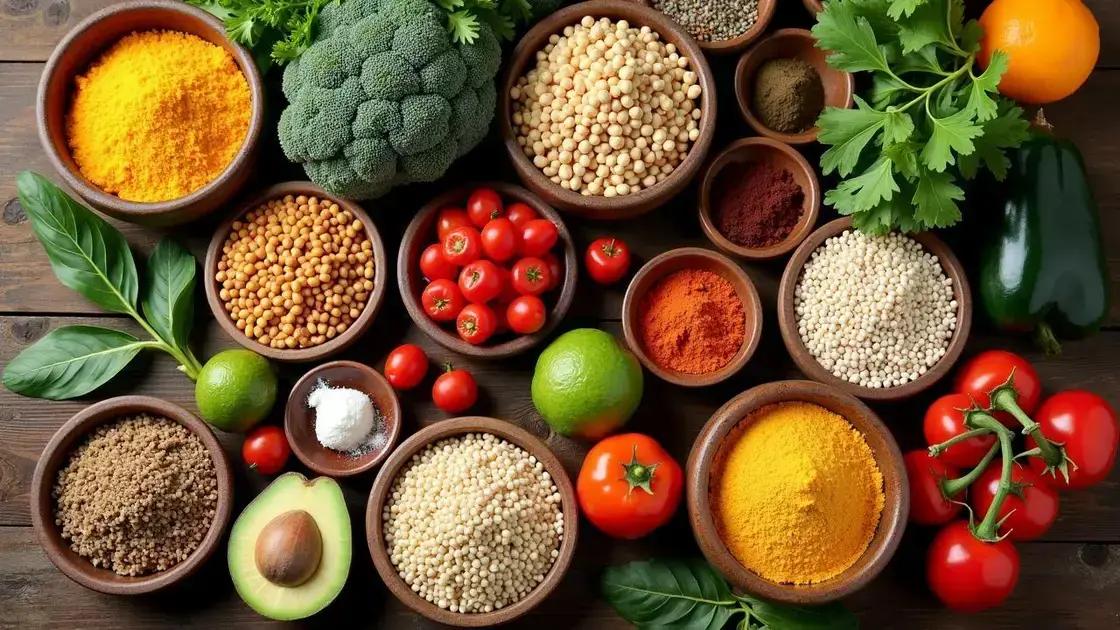To optimize the benefits of the African recipe, focus on key ingredients like whole grains, fresh vegetables, and spices. Use cooking techniques such as steaming and grilling to maximize flavor and nutrition in your dishes, ensuring they are both delicious and healthy.
Are you looking to enhance your culinary skills while reaping the health benefits of traditional African cuisine? This article dives into how to optimize the benefits of the African recipe, bringing together rich flavors and nutritional value. We’ll explore key ingredients and techniques that not only elevate the taste but also contribute to overall wellness. Whether you are a seasoned cook or a beginner, these insights will empower you to savor the goodness of African dishes.
Key Ingredients of African Recipes

Understanding the key ingredients in African recipes is crucial for optimizing their benefits. African cuisine is rich in diverse flavors and nutritional profiles, making it a delightful choice for health-conscious individuals.
Common Ingredients
Staples such as grains like millet, sorghum, and rice form the foundation of many meals. These carbohydrates provide energy and are often paired with protein sources like legumes, which include lentils, beans, and peas. Incorporating these ingredients leads to a balanced plate.
Fruits and Vegetables
Fresh fruits and vegetables play a vital role in African cooking. Ingredients like spinach, okra, and sweet potatoes are rich in vitamins and minerals. Adding these to your dishes not only enhances flavor but also boosts nutritional value.
Spices and Seasonings
Spices such as ginger, coriander, and cumin are often used to elevate the taste of African recipes. These spices are not just flavorful; many have antioxidants and health benefits. Utilizing them can help you create dishes that are both delicious and nutritious.
Healthy Fats
Healthy fats, such as those found in avocado, nuts, and olive oil, are also important in these recipes. They aid in the absorption of fat-soluble vitamins and provide essential fatty acids necessary for overall health. Make sure to include a source of healthy fats in your meals.
By focusing on these key ingredients, you can optimize the benefits of the African recipe while enjoying the unique and diverse flavors that this cuisine has to offer.
Techniques to Maximize Flavor and Nutrition

To maximize flavor and nutrition in African recipes, it’s vital to utilize various cooking methods and techniques. These approaches not only enhance taste but also help retain the nutritional value of the ingredients.
1. Steaming
Steaming vegetables like broccoli or collard greens preserves their nutrients and bright colors. This method cooks the food gently, keeping vitamins intact. Steaming is a great technique to prepare dishes while ensuring healthy options.
2. Grilling
Grilling adds a smoky flavor that can elevate any meal. Marinate your proteins like fish or chicken with spices before grilling. The heat caramelizes the sugars in the ingredients, bringing out rich flavors. Plus, grilling allows excess fat to drip away, making the meals healthier.
3. Sautéing
Sautéing vegetables in a small amount of healthy oil, like olive oil, helps to release their natural flavors. Consider using aromatic ingredients such as garlic and onions to enhance your dishes. This technique cooks quickly and helps retain nutrients compared to simmering.
4. Using Fresh Herbs and Spices
Fresh herbs such as cilantro and parsley are not just for garnishing; they pack a punch of flavor and nutrients. Incorporating spices like turmeric and paprika can enhance the dish’s flavor profile while offering health benefits such as anti-inflammatory properties.
5. Incorporate Whole Grains
Instead of white rice or pasta, opt for whole grains like quinoa or bulgur. These grains add texture and provide fiber, helping to keep you full longer. They’re also full of vitamins and minerals that support overall health.
By mastering these techniques, you can take your African recipes to the next level, making them delicious while ensuring they remain nutritious.
Embrace the Richness of African Recipes
By understanding and utilizing the key ingredients of African recipes, you can unlock a world of flavor and nutrition. The techniques discussed, such as steaming, grilling, and sautéing, not only elevate the taste of your dishes but also preserve their nutritional benefits.
Incorporating whole grains and fresh herbs can further enhance the healthiness of your meals, making them both satisfying and beneficial for your overall well-being.
As you explore the diversity of African cuisine, remember that maximizing flavor involves embracing its rich cultural heritage. With each dish, you not only nourish your body but also celebrate the vibrant traditions of Africa.
FAQ – Frequently Asked Questions about Optimizing African Recipes
What are the key ingredients in African recipes?
Key ingredients often include grains like millet and rice, fresh vegetables, fruits, and spices that enhance both flavor and nutrition.
How can I maximize flavor in my African dishes?
You can maximize flavor by using techniques like grilling, sautéing, and incorporating fresh herbs and spices into your recipes.
Why are whole grains important in African cooking?
Whole grains add texture, fiber, and essential nutrients, making meals more satisfying and nutritious compared to processed grains.
What are some healthy cooking methods for African cuisine?
Healthy cooking methods include steaming and grilling, which help retain nutrients and enhance the flavors of the food.
How can I ensure my African recipes are nutritious?
By focusing on fresh ingredients, incorporating a variety of vegetables, and using healthy fats, you can ensure that your recipes are both flavorful and nutritious.
Can I adapt traditional African recipes for modern diets?
Yes! You can substitute healthier ingredients or adjust cooking methods to fit into modern dietary preferences while keeping the essence of traditional recipes.













